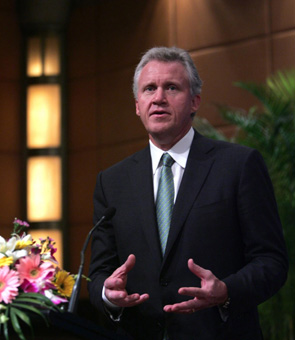
In the last few years, companies have come to realize that environmental protection is more than just bearing regulatory burdens, absorbing costs and managing risks. Smart executives now recognize that companies can profit by providing solutions to problems like climate change, water availability, air pollution and chemical exposures.
No executive better exemplifies this new attitude than General Electric's CEO Jeffrey Immelt. While his predecessor Jack Welch battled America's Environmental Protection Agency over the cleanup of the Hudson and Housatonic Rivers, Immelt has positioned GE to be a leader in pollution control and natural-resource management. He has launched an "ecomagination" campaign designed to promote GE's high — efficiency locomotives and jet engines, wind turbines, solar power and water-purification systems, and a range of cleaner coal technologies.
By spearheading the formation of the U.S. Climate Action Partnership, a consortium of companies and NGOs that earlier this year asked the Bush Administration to take action against the buildup of greenhouse gases, Immelt has paved the way for hundreds of other business leaders to commit themselves to finding climate-change solutions. But his environmental focus does not derive from an overweening sense of corporate social responsibility. Immelt believes that GE's eco-leadership will position it for success in a range of high-growth and high-margin markets. "Green is green," he declares.
Beyond praising Immelt's vision, society should celebrate that environmental technology development is shifting from government to business. Regulators have an important role to play in structuring market incentives to encourage innovation and stir business interest in environmental issues. The private sector, however, can deploy far more capital, explore more diverse options and take bigger risks, all while inducing entrepreneurs, venture capitalists and creative thinkers to search for breakthroughs. By committing GE to respond to the world's need for better pollution control, safer water, improved energy efficiency and alternative power sources, Immelt has led the way toward a future of business-driven environmental advances.
Dan Esty is the Hillhouse professor of environmental law and policy at Yale University and co-author of the recent book Green to Gold